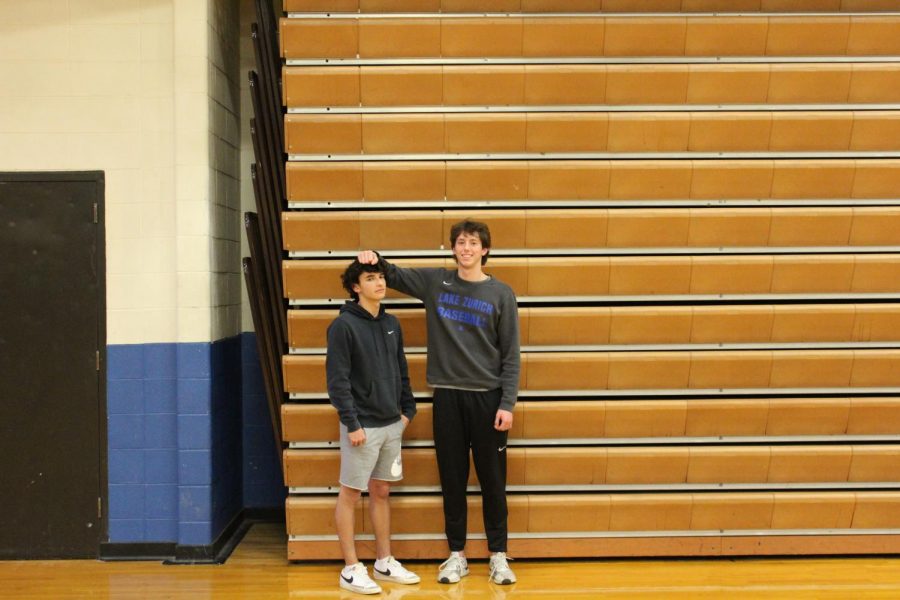Against all odds
Athletes show how they fight back against stereotypes
Photo by Parker Carley
Ben Elias and his fellow teammate on the basketball team show their visible height difference
Athletes in different sports may be held to certain standards because of built in stereotypes. Players who do not fit these predetermined stereotypes find ways to prove to society they can still excel in the sport they play. Stereotypes are defined as a generalized belief about a particular category of people. It is an expectation that people might have about every person of a particular group.
Basketball
Stereotypes spread into other sports such as basketball, with many people believing that one must be tall to excel in the sport. Ben Elias, senior basketball player, breaks this stereotype with his rather short height of 5’7.
“I feel like the stereotype exists because of all the positives of being tall in basketball. Players who are tall are able to get a rebound or are able to block a shot much easier compared to someone who is vertically challenged,” Elias said.
Although Elias is on the shorter side compared to his fellow teammates, he finds ways to use his height to his advantage on the court.
“I get low on the court and do certain things that other [players] who are taller than me aren’t able to,” Elias said. “If I’m down low dribbling the ball, it’s a lot harder for the other team, if they’re a lot taller, to get down there and take [the ball] away from me.”
In order to earn his spot on the court Elias has had to prove to people, whether it be coaches or teammates, that he deserves a chance to play.
“I have exhibited resiliency throughout all my years of playing basketball because of how much shorter I am. A lot of people when they see me out on the court they’re like ‘this guy can’t do anything.’ It motivates me to prove them wrong,” Elias said. “I took that up not just in basketball, but up until high school through junior high in elementary school when I played other sports because of how small I was.”
Being tall in sports such as basketball still has several advantages, but doesn’t define a player’s overall skill, according to Elias.
Elias says playing basketball has been “challenging for me because of my height, but I love the challenge and use that to motivate me on and off the court!” He also says that being “the shortest out of the senior class,” helped him learn that the real thing that matters in a sport is putting in effort and commitment.
“I think the only thing that matters in sports really is hard work and dedication. I think that’s what separates people from each other, because there are people who are good at a sport and there are people who are bad at a sport but neither of them may put in the effort and time,” Elias said. “I do not think that height has an impact on anyone’s skill, especially not in basketball.”
Wrestling
Angie Vitiritti, 2019 grad and current Campbellsville university wrestler, breaks the stereotype that only guys can be a part of the wrestling team. Vitiritti gained interest in wrestling during middle school, but immediately faced backlash.
“Surprisingly, a lot of [the hate] was from the parents, which is kind of hard to imagine sometimes because I was 12 or 13 years old, and there’s these grown women telling me that I shouldn’t be on the mat, and that’s hard to comprehend as a child,” Vitiritti said. “I was just trying to wrestle and just enjoy the sport, and I [had] older adults telling me that I shouldn’t be doing that, which [was] frustrating.”
While wrestling is known to be a male dominated sport, female wrestlers do not “get the respect they deserve,” says Vitiritti. However, much to Vitritti’s surprise, many of her guy teammates treated her as one of their own, she said.
“I definitely had some guys on my teams who were super cordial with me and enjoyed having me there. They understood that I was there for the same reasons that they were,” Vitritti said.
Although Vitritti says she feels that she does not “need [others’] opinions,” because “it doesn’t really affect [her],” societal views of girls being a part of a wrestling team tend to be negative.
Vitiritti says the controversy around swapping gender roles in wrestling has forced her to prove to others that she deserves a spot on the mat.
“I figured if I could outwork everybody and prove to the coaches that I was there for a real reason, I wasn’t there just to goof around and flirt with the boys or something like that which tended to be a common thing that the coach just thought I was there to do,” Vitiritti said. “I showed up every day ready to work and worked really hard, and people eventually started giving me the respect that I deserved.”

Going into her senior year, this is Parker’s second year on staff and first year as magazine editor in chief for the Bear Facts program. She plans to...

